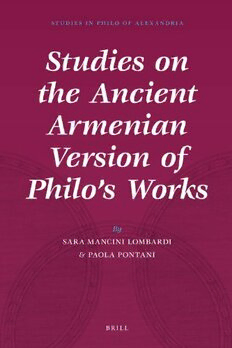Table Of ContentStudies on the Ancient Armenian Version
of Philo’s Works
Studies in Philo
of Alexandria
Editedby
Francesca Calabi
and
Robert Berchman
EditorialBoard
Kevin Corrigan (EmoryUniversity)
Louis H. Feldman (YeshivaUniversity,NewYork)
Mireille Hadas-Lebel (LaSorbonne,Paris)
Carlos Lévy (LaSorbonne,Paris)
Maren Niehoff (TheHebrewUniversityofJerusalem)
Tessa Rajak (UniversityofReading)
Roberto Radice (UniversitàCattolica,Milano)
Esther Starobinski-Safran (UniversitédeGenève)
Lucio Troiani (UniversitàdiPavia)
VOLUME6
Studies on the
Ancient Armenian Version
of Philo’s Works
Editedby
Sara Mancini Lombardi and Paola Pontani
LEIDEN•BOSTON
2011
Thisbookisprintedonacid-freepaper.
LibraryofCongressCataloging-in-PublicationData
StudiesontheancientArmenianversionofPhilo'sworks/editedbySaraManciniLombardi
andPaolaPontani.
p.cm.–(StudiesinPhiloofAlexandria;v.6)
Includesbibliographicalreferencesandindex.
ISBN978-90-04-18466-4(hardback:alk.paper)
1.Philo,ofAlexandria.I.ManciniLombardi,Sara.II.Pontani,Paola.III.Title.IV.Series.
B689.Z7S782011
181'.06–dc22
2010040416
ISSN 1543-995X
ISBN 9789004184664
Copyright2011byKoninklijkeBrillNV,Leiden,TheNetherlands.
KoninklijkeBrillNVincorporatestheimprintsBrill,HoteiPublishing,
IDCPublishers,MartinusNijhoffPublishersandVSP.
Allrightsreserved.Nopartofthispublicationmaybereproduced,translated,storedin
aretrievalsystem,ortransmittedinanyformorbyanymeans,electronic,mechanical,
photocopying,recordingorotherwise,withoutpriorwrittenpermissionfromthepublisher.
AuthorizationtophotocopyitemsforinternalorpersonaluseisgrantedbyKoninklijkeBrillNV
providedthattheappropriatefeesarepaiddirectlytoTheCopyrightClearanceCenter,
222RosewoodDrive,Suite910,Danvers,MA01923,USA.
Feesaresubjecttochange.
CONTENTS
Foreword............................................................... vii
Introduction ........................................................... 1
GabriellaUluhogian
‘ArmenianPhilo’:aSurveyoftheLiterature .......................... 7
AnnaSirinian
MarginalNotesontheArmenianTranslationoftheQuaestioneset
SolutionesinGenesinbyPhilo...................................... 45
GiancarloBolognesi
TheArmenianVersionofPhiloAlexandrinus.Translation
Technique,BiblicalCitations ....................................... 51
GoharMuradyan
Philo’sDeProvidentia:aWorkbetweenTwoTraditions ............. 87
MaurizioOlivieri
Saying(almost)theSameThing.OnSomeRelevantDifferences
betweenGreek-LanguageOriginalsandtheirArmenian
Translations ......................................................... 125
PaolaPontani
Philo’sStylemesvsArmenianTranslationStylemes .................. 147
RomanoSgarbi
PhiloandtheBookofCausesbyGrigorAbasean..................... 155
ManeaErnaShirinian
The‘ArmenianPhilo’:aRemnantofanUnknownTradition......... 191
OlgaVardazaryan
IndexofModernAuthors ............................................. 217
IndexofPhilonicPassages............................................. 221
FOREWORD
The volume editors1 wish to express their thanks to all those who have
madepublicationpossible:inthefirstplacetoFrancescaCalabi,whose
initiative has sparked off the enterprise; and then to all the friends and
colleagueswhohavecontributedtoit,providingpreciousguidanceand
advice,particularlyAnnaSirinianforherinvaluableinput,RosaBianca
Finazzi,PaolaTornaghiandAnnaPassoniDell’Acqua,andalsoBarbara
CrostiniLappinandRichardWestall,whoeditedtheEnglishtranslation.
WewouldparticularlyliketorememberthelateProfessorGiancarlo
Bolognesihere.WhenwefirstmentionedourplanforavolumeonPhilo’s
Armenian translations to him, he was both enthusiastic and pledged
his own participation. His initial intention was to provide an essay on
De Providentia, but, sadly, his death barred the way to the fulfilment
of his plan. It seemed nevertheless entirely appropriate to allow his
name to appear in the volume through the reprinting of one of his
articlesregardingapassageinPhilo’sQuaestiones.2Wealsomeanttopay
due homage to Bolognesi’s scholarliness and to the memory of a much
lamentedteacherandmaster.
It is the editors’ role to provide an overall coherence to a volume
of collected studies. Such a thankless task—having to select and apply
conventions which are not always entirely satisfactory—is nevertheless
absolutely required of a volume whose intended audience goes beyond
the exclusive readership of experts in the field of Armenian, reaching
scholars in other disciplines too. With regard to the editorial choices,
wedecidedtostandardizethebibliographicalreferences’transliteration
accordingtothebibliographyofR.W.Thomsom,3sothatnon-Armenian
scholars in particular may be able to more easily trace the references
1 SaraManciniLombardihaseditedpp.I–andPaolaPontanipp.–.
2 On the same passage see Philon von Alexandrien. Über die Gottesbezeichnung
“wohltätigverzehrendesFeuer”(DeDeo),RückübersetzungdesFragmentsausdemArme-
nischen,deutscheÜbersetzungundKommentarvonF.Siegert(WissenschaftlicheUnter-
suchungenzumNeuenTestament,),MohrSiebeck,Tübingen,–.
3 R.W.Thomson,ABibliographyofClassicalArmenianLiteraturetoAD(Cor-
pusChristianorum),Brepols,TurnhoutandId.,SupplementtoABibliographyof
ClassicalArmenianLiteraturetoAD,“LeMuséon”,/–,,–.
viii foreword
shouldtheywishtoreadfurtheronthissubject.Whereprimarytextsare
cited,wehaveusedtransliterationwhereverthatappearedtobeusefulto
readerswithoutaknowledgeofArmenian.
Finally,wehavedecidednottoprovideanadditionalbibliographyat
the end of the volume since it would be redundant: wide and updated
bibliographicalreferencesare,infact,availableintheAppendicesadded
toAnnaSirinian’sarticle.
SaraManciniLombardi
PaolaPontani
INTRODUCTION
GabriellaUluhogian
Weowe a debt of gratitude to FrancescaCalabi, whose suggestion gave
risetothepresentEnglish-languagevolume.Itcanbeviewedasacom-
paniontothecollectivevolumeItalianStudiesonPhiloofAlexandria,that
dealswiththeGreekversionsandwhichsheeditedforthissameseries.
Our aim is to provide as wide an audience as possible with the latest
scholarshipregardingtheancientArmenianversionsofPhilo’swritings.
ThiscollectionofessaysisemblematicofthecontributionoftheItalian
schoolofArmenianStudies—asitisnowwidelyknown—onthismajor
Alexandrian author within the panorama of studies devoted to Arme-
niantranslationsofGreektextsoverthelastfiftyyears.GiancarloBolo-
gnesi,professorattheCatholicUniversityatMilan,wasthepioneerand
promoterofthisbranchofstudiesinItaly.Convincedofthefundamen-
tal importance of the Armenian translations produced by the so-called
‘HellenizingSchool’betweentheendofthefifthandtheeighthcenturies,
hewroteseveralarticlesaboutthissubjectfromboththelinguisticand
thephilologicalpointofview,therebyarousingakeenscholarlyinterest
attheinternationallevelthatextendsasfarasArmeniaitself.Reprinted
inthisvolumeisanoteworthyarticleofhisfirstpublishedin.Ofthe
eightarticlesconstitutingthisvolume,fourarewrittenbydirectorindi-
rect pupils of the late Professor Bolognesi, and the remaining three are
studiescomposedbyscholarsfromArmenia.Wemayideallyconnectthe
intenseactivityofinnovativeresearchinthisfieldinArmeniaitselfwith
thisinitialimpetusfromthe‘Italianschool’throughthosecolloquiaand
seminarsthatpromotedfruitfulexchangesandanadvantageousrecipro-
calclimateofcooperation.
The book starts off with the article by Anna Sirinian, whose modest
subtitle‘asurveyoftheliterature’shouldnotmisleadus.Herewehavea
substantialanddensecontributionthatillustratesthoroughlyandinan
orderedmannertheslow,progressivelabouringovertheArmeniantext
fromthefirstdecadesofthenineteenthcenturydowntothepresent.It
includesaclearpresentationofthereasonswhytheArmenianversionof
PhiloisextraordinarilyimportantnotonlyforGraeco-Jewishcultureand
overallresearchintothetranslationtechniquesemployedinArmenian,

